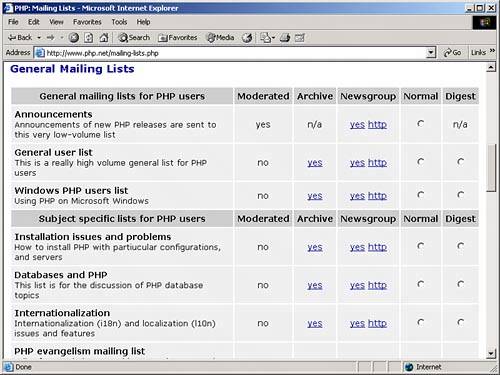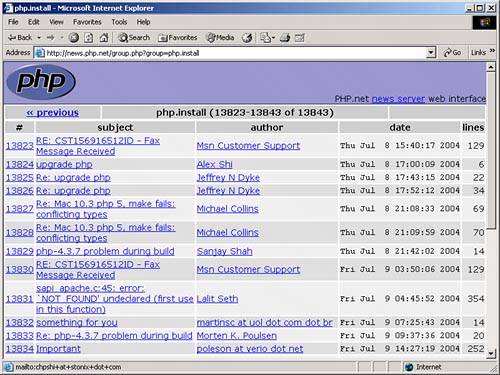Mailing Lists and NewsgroupsWhereas most of the aforementioned websites offer up-to-date PHP information, there is very little interaction: If you have a programming problem, it is hard to get help. In that situation, newsgroups and mailing lists are the better choice. http://www.php.net/mailing-lists.php lists most of those lists (see Figure E.2); here we present the most relevant ones. Figure E.2. All PHP mailing lists in a nutshell. However, do note that mailing lists and newsgroups are about giving and taking. Just posing question after question and never trying to answer other people's questions will not get you good answersat least not for long. There are also some common rules for mailing lists and newsgroups:
All official php.net mailing lists are also available via newsgroup access. There is a Web-based newsreader at http://news.php.net/group.php?group=<name-of-group> (see Figure E.3). However, it is rather slow, so you might consider using a newsreader or http://groups.google.com/ for this task. Figure E.3. PHP.net offers Web-based newsgroup access. About the mailing liststhe aforementioned overview page (refer to Figure E.2) offers the possibility to subscribe to individual lists. Apart from getting each email, there is also a digest option. In that case, you get cumulative emails only once a day or so, when enough postings have been sent to the list. After subscribing to a list, you have to confirm your email address by visiting a link in a verification email you get. Afterward, you are subscribed to the mailing list. Apart from the php.net newsgroups, there are also standard newsgroups for PHP in Usenet, without the possibility to subscribe by email. Following is a list of all relevant PHP newsgroups offered. All groups starting with php.* are official ones and hosted at php.net.
There are also a number of internal lists, such as those for developers or people with CVS accounts; they are listed on http://www.php.net/mailing-lists.php. |